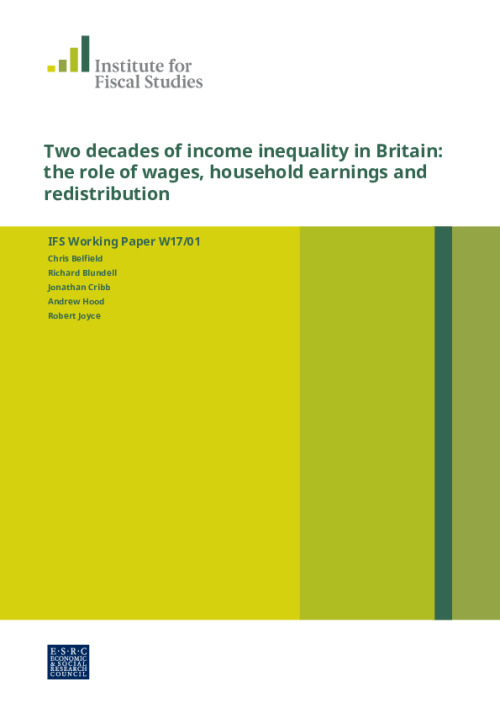Downloads

WP201701.pdf
PDF | 698.48 KB
We study earnings and income inequality in Britain over the past two decades, including the period of relatively “inclusive” growth from 1997-2004 and the Great Recession. We focus on the middle 90%, where trends have contrasted strongly with the “new inequality” at the very top. Household earnings inequality has risen, driven by male earnings – although a ‘catch-up’ of female earnings did hold down individual earnings inequality and reduce within-household inequality. Nevertheless, net household income inequality fell due to deliberate increases in redistribution, the tax and transfer system’s insurance role during the Great Recession, falling household worklessness, and rising pensioner incomes.
Authors

CPP Co-Director
Richard is Co-Director of the Centre for the Microeconomic Analysis of Public Policy (CPP) and Senior Research Fellow at IFS.

Deputy Director
Robert is a Deputy Director. His work focuses on primarily on the labour market, income and wealth inequality, and the design of the welfare system.

Associate Director
Jonathan is an Associate Director and Head of Retirement, Savings and Ageing sector, focusing on pensions, savings and later-life economic activity.

Andrew Hood

Chris Belfield
Working Paper details
- DOI
- 10.1920/wp.ifs.2017.1701
- Publisher
- The IFS
Suggested citation
Belfield, C et al. (2017). Two decades of income inequality in Britain: the role of wages, household earnings and redistribution. London: The IFS. Available at: https://ifs.org.uk/publications/two-decades-income-inequality-britain-role-wages-household-earnings-and-redistribution (accessed: 2 May 2024).
More from IFS
Understand this issue

Sure Start achieved its aims, then we threw it away
15 April 2024

Social mobility and wealth
12 December 2023

How important is the Bank of Mum and Dad?
15 December 2023
Policy analysis

Living standards since the last election
21 March 2024

Recent trends in public sector pay
26 March 2024

Gap between higher- and lower-paid public sector workers falls by more than a third since 2007 as doctors and experienced teachers have faced unprecedented pay cuts
26 March 2024
Academic research

Labour market inequality and the changing life cycle profile of male and female wages
15 April 2024

Interpreting cohort profiles of lifecycle earnings volatility
15 April 2024

There and back again: women’s marginal commuting costs
2 April 2024